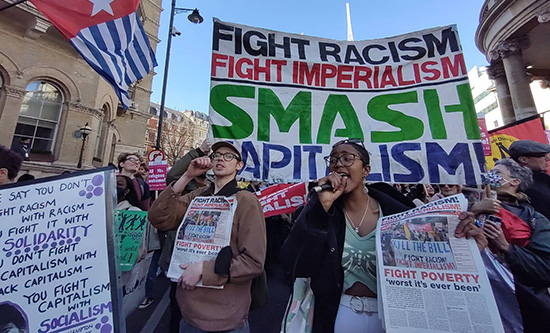
More than a fifth of Britain’s population are living under the poverty line. In November, the UN rapporteur on extreme poverty warned the government that its renewed attack on the living standards of the poor was so severe it could constitute a breach of Britain’s human rights obligations. Olivier de Schutter told Rishi Sunak that the measures would increase hunger and malnutrition, adding, ‘You do not impose austerity measures when the whole population is facing a cost-of-living crisis.’ The UN Human Rights Council listed 300 recommendations the British government needed to implement urgently to provide food security for children and prevent homelessness. Inevitably, these warnings have been contemptuously ignored as the government unleashes a brutal new offensive against the working class.
There are 800,000 children in England living in poverty who do not qualify for free school meals. Many are turning up to school having had no breakfast and with nothing but scraps for packed lunches. Headteachers are reporting that some children are resorting to eating erasers. While the poorest families do not have two pennies to rub together, Tesco, Britain’s biggest supermarket chain, is rubbing its hands together with profits for 2022/23 expected to reach £2.5bn.
To be eligible for free school meals you must be in receipt of Universal Credit and have a household income of less than £7,400 a year after tax, excluding benefits. Despite soaring inflation, the threshold has been frozen at this level since 1 April 2018. Had this limit been increased with inflation to £8,575, an additional 110,000 children would be eligible in England. Instead they have been condemned to months and perhaps years of hunger. Over 50 health experts signed a joint letter in November to Jeremy Hunt demanding an urgent expansion of free school meals to deal with a massive rise in malnutrition. It stated that, according to the Food Foundation, nearly ten million adults and four million children experienced food insecurity in September and that levels of food insecurity among households with children have more than doubled since January, reaching 25.8% in September 2022. A common picture is painted by a GP who signed the letter when he said, ‘We are seeing thin, pale children who lack the energy of a normal child’. In Scotland thousands of children have been treated for malnutrition in hospitals. Between 2018 and 2022, NHS Greater Glasgow and Clyde recorded 3,895 admissions of children under the age of 18 to an acute hospital for malnutrition. In 2021 alone, the numbers almost doubled from 572 to 1,000.
More and more people are going hungry, missing meals and turning to food banks to survive because food prices are rising at their fastest rate in 45 years, with food price inflation hitting 16.2% in the year to October. The price of low-fat milk has increased by 47.9%, margarine by 42.1% and pasta by 34%. Overall inflation is 11.1% – a 41 year high. The proportion of people who cannot afford to eat a healthy, balanced diet rose to 36% in October. In the same month the Joseph Rowntree Foundation reported that a third of people had eaten food past its use-by date because they could not afford to buy more food, and a quarter ate cold food because they could not afford to cook.
The poorest households spend around half their income on food and energy bills compared to about a third for those on middle incomes. This, according to the Resolution Foundation, means that the effective inflation rate for the poor is higher than average: 12.5% for the poorest 10% of households, compared with 9.6% for the richest 10%. The North East has the highest rate of child poverty in Britain. Newcastle’s West End food bank is one of the most used food banks in the country. Since June it has been giving out around 2,000 emergency food parcels every month – 400 parcels more than its previous monthly average.
According to the Joseph Rowntree Foundation, 22% of the population, 14.5 million people, live in relative poverty. There were 3.9 million children living in poverty in Britain in 2020/21. That is 27% of all children – eight in a classroom of 30. Poverty disproportionately hits children in Black and Minority Ethnic families with 46% living in poverty compared with 26% of children in white British families. Employment does not guarantee a route out of poverty; 75% of children growing up in poverty live in households where at least one person works. The statistics will only worsen as amongst other indicators unemployment is due to increase by half a million next year.
Meanwhile energy bills will increase by another £500 in April. Four out of ten of the poorest households are not on benefits and so do not qualify for the £650 Cost of Living payment grudgingly offered by the government to help with soaring energy bills. Nearly seven million households, a quarter of all households, are already in fuel poverty; this is expected to rise to 11 million next year. Former Prime Minister Liz Truss guaranteed that energy bills would be frozen at £2,500 for two years. Even this was massively unaffordable for millions of people but it has now been scrapped by the new prime minister, Rishi Sunak, and his Chancellor Jeremy Hunt and will be increased to £3,000 in April 2023. The Office for National Statistics said gas and electricity prices were still up by nearly 130% and 66% respectively compared with a year ago.
It makes no difference how many reports, warnings and letters are issued by UN experts or medical professionals. They are a matter of total contempt to this ruthless government – as is the suffering and hunger of growing numbers of the population. Change will only come when we start to organise against this brutal capitalist system and for one that provides for the needs of the working class – that is, for socialism.
Mark Moncada
FIGHT RACISM! FIGHT IMPERIALISM! 291 December 2022 /January 2023




